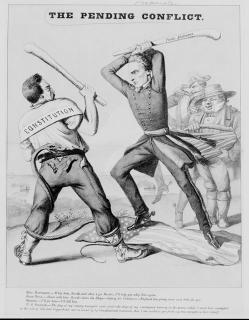

A truck driver once asked me to explain to him as to why there was no peace in the Middle East. I proceeded to explain. He did not let me talk for long. Apparently he prided himself in keeping up with the news.
"So why do we not give a small chunk of Arizona to the Palestinians, and be done with it!" he said.
Makes perfect logical sense. Why not! 2+2 is 4. Be done with it. Palestinians want land, let's give them land, and a better living. But the logic does not penetrate the emotional forces at work in a conflict situation like the Israel-Palestine scenario. Peace making is primarily managing the many disparate emotions on the ground.
The same can be said of the triangular conflict in Nepal. All three parties to the conflict, mainly the two guns, feel like people who offer logical solutions and roadmaps are just being naive. They fear their relative power might diminish in the process. The two guns are constantly angling for an inch or two of political territory.
It is perhaps like a complicated marriage situation, or a
 marriage gone awry situation. The two parties to the conflict see a reality that might be near impossible for an outsider to see.
marriage gone awry situation. The two parties to the conflict see a reality that might be near impossible for an outsider to see.As they say, you do not have to agree with them, but it helps to try to understand. Why do they do what they do? What are the forces at work? What options do they see before the choices they make?
From a distance the slow speed of progress on the part of each party to the conflict catches attention. It is like watching bullock cart motion.
The parties to the conflict do not have the luxury to look at developments with the detachment someone like me can, from a distance.
On the other hand, only a detached, neutral observer can best facilitate the peace process, seek common ground. The skills associated are as much of emotion management as anything else.
I believe I am going to read up into the Mid-East conflict to try and get a fe
 el for some of the emotional forces at work in the Nepali context. Right now I am into a book that takes the alternate view that no, it was not Arafat's fault that peace was not achieved in 2000.
el for some of the emotional forces at work in the Nepali context. Right now I am into a book that takes the alternate view that no, it was not Arafat's fault that peace was not achieved in 2000.I think the mistake western peace makers make in the context of Mid-East is to put the two parties on equal footing. The Palestinians are much weaker. That asymmetry has to be taken into account.
In The News
- 600 kidnapped students found in Nepal CBC News, Canada
- Rebels Kidnap 500 Students in Nepal
ABC News - `Gyanendra has assured that democracy will return to Nepal' Hindu, India
- Students defy ban order in Nepal Hindu, India
- Bargain between guns and democracy in Nepal
Scoop.co.nz (press release) - Nepal rebels 'beat aid workers' BBC News, UK
- Nepal police break up pro-democracy rally
Reuters - 'Maoist war funded by drugs in Nepal' Times of India, India
- Donors suspend work after Nepal Maoist attack:-Webindia123, India
- Police Arrest Dozens of Demonstrators in Nepal Voice of America
